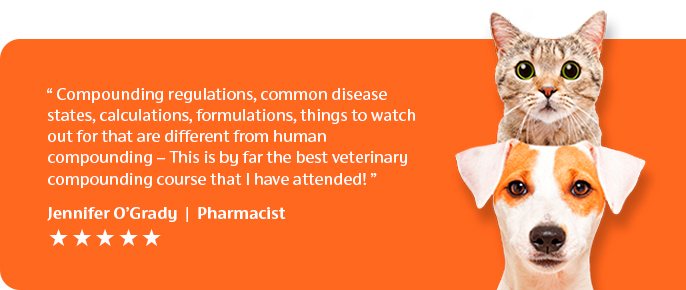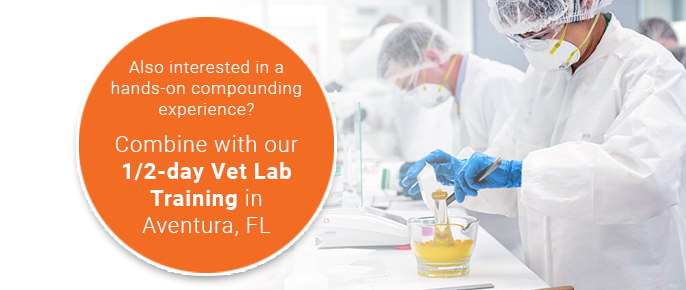
Veterinary compounding seminar: A customized approach
In this live activity, participants will gain a fundamental understanding of veterinary pharmacy and applicable skills in customized medications.
COURSE FORMAT
1.5-day live virtual seminar (12 hours) that allows you to connect and interact online, in real time, through open mic Q&A sessions, group discussions, polls, and online chats. Practically apply your knowledge through customized formula development and case assessments. Leave the live event with a comprehensive manual containing references, resources, and tools that will help you expand your veterinary compounding practice and optimize therapeutic outcome for your veterinary patients.
COURSE DESCRIPTION
Veterinary pharmacy is a well-established niche specialty that is high in demand and diverse in opportunity. Although once dominated by veterinarians, pharmacists now play an essential role in the treatment of animals. Contrary to typical pharmacy for human patients, veterinary pharmacy is uniquely challenged with treating a diverse range of species, on top of individual variations, concerns with patient non-compliance, and limited veterinary drug availability. Addressing these challenges and obstacles requires specialized knowledge in species-specific physiology, pathophysiology, pharmacology, and behavior; much of which exceeds what is taught in pharmacy school.
- Recognize species-specific pharmacokinetics, drug contraindications, patient compliance, treatment efficacy, and drug availability – all variables that set the need for customized pharmacotherapy.
- Interpret and appraise veterinary compounding regulations; how do they differ from human compounding?
- Explore compounding opportunities in the form of adjusting dosage strength, customizing dosage forms, and tailoring ingredient selection based on animal specificities and tolerances.
- Discuss key compounding principles, including the benefits and risks of different routes of administration, the appropriate application of excipients, and the incorporation of flavoring agents.
- Develop 2 customized formulas from scratch applying day-to-day compounding references, selecting appropriate ingredients, performing appropriate pharmacy calculations, among more.
- Investigate customized treatment options for 12 common animal disease states – canine keratoconjunctivitis sicca, feline herpesvirus-1, equine conreal ulceration, canine atopic dermatitis, equine scratches, feline & canine epilepsy, feline hyperthyroidism, canine diarrhea, feline gastroparesis, feline urine spraying, and feline situational anxiety.
- Apply your knowledge with 4 case studies (canine, feline, equine, and avian) that require you to properly diagnose and treat the patient.
- Put your business hat on and discuss marketing tips and tricks to grow your veterinary compounding business.
INTENDED AUDIENCE
Pharmacists, pharmacy technicians, and other compounding personnel looking to get into or are currently engaged in veterinary compounding.
LEARNING OBJECTIVES
PHARMACISTS
- Examine the challenges associated with veterinary pharmacy, including species-specific pharmacokinetics, patient compliance, drug availability, and drug contraindications.
- Recognize the need for customized medication opportunities for the treatment of veterinary animals with emphasis placed on dogs, cats, and horses.
- Evaluate the different ways compounding can achieve customization and address the difficulties associated with veterinary pharmacy.
- Apply skills of reasoning and interpretation in appraising current regulatory standards, recommendations on compounding veterinary drugs, and drug information resources.
- Investigate the benefits and challenges of various routes of administration and dosage forms.
- Compare and contrast the advantages of various excipients, species-specific intolerances to certain excipients, and how to correctly use them in compounding.
- Discuss customization opportunities for the pharmaco-treatment of various animal disease states, including canine dermatitis, feline herpes virus-1, equine corneal ulceration, canine epilepsy, feline hyperthyroidism, feline gastroparesis, and feline urine spraying among more.
- Acquire marketing tips and skills needed to commence or expand your veterinary pharmacy practice.
PHARMACY TECHNICIANS
- Recognize the drawbacks and limitations of veterinary-labeled products available on the market today.
- Discuss the need for customized medications to address the challenges of veterinary pharmacy.
- Apply skills of reasoning and interpretation in appraising current regulatory standards and recommendations for compounding veterinary drugs.
- Identify the challenges of animal patient compliance and how to address these difficulties with alternate routes of administration, flavoring oral preparations, and applying appropriate dispensing devices.
- Investigate the benefits and challenges of various routes of administration and dosage forms.
- Compare and contrast the advantage of various excipients and how to correctly implement them in compounding.
- Practice customizing formulations.
- Discuss various veterinary disease states and learn about specific opportunities for customization and compounding.
TESTIMONIALS
"I would recommend this course because of the details provided. The handouts were practical and very informative. The presenter was very knowledgeable on the subject matter. The format of the course was excellent and the lab option was a great way to ensure that the subject material is understood. I am now more confident in my vet compounding abilities and this training will help me with my veterinary patients and their owners.”
Bonnie Meyerink | Pharmacist, South Carolina
“Pharmacy- and veterinary-specific compounding regulations, common disease states, calculations, formulations, things to watch out for that are different from human compounding, and compounding techniques - this is by far the best veterinary compounding course that I have attended! I would recommend this course to compounders who are new to vet compounding, as well as compounders who have been in the field for a long time.
Jennifer O’Grady | Pharmacist
“I have been involved in veterinary compounding for 20+ years. This course was very comprehensive and I picked up several new “tricks” that will be beneficial to my practice.”
Mark Smith | Pharmacist, South Carolina
PROMOTIONAL VIDEO
FINANCIAL SUPPORT
This learning activity has received financial support from MEDISCA Inc. in the form of an educational grant.
COPYRIGHT
This CE Activity is Copyright © 2017-2024 LP3 Network.

